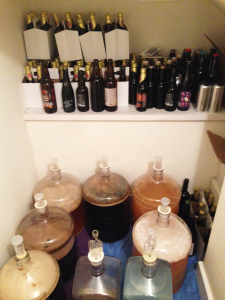
It’s true that craft breweries nowadays are as ubiquitous as fast food restaurants. But unlike a common retail chain, each craft brewery differentiates itself by showcasing unique flavor profiles of beer. Some specialize in hoppy IPAs, while others like to develop a rich and complex stout reminiscent of campfire s’mores (we’re looking at you Wild Woods Brewery). Like a painter to his portrait, or a chef to his culinary art, the personal attention and thoughtful care in today’s brewing results in a rich, flavorful beverage we can’t get enough of.
In many ways craft brewing has its roots in homebrewing, which gained traction in the early 20th century during Prohibition—where it became a kind of home skill passed through the generations like baking or canning. Brewing beer has evolved into an art, as brewers experiment with different hops, fruits, fermentation periods and more to enhance and develop rich flavor profiles.
And the public loves it!
These new craft beers vary in flavor and aroma, showcasing unique flavors not typically found in regular offerings. Which is why even if you’re not a craft brewer, you should consider hopping on the trend by offering customers a selection of local (and popular) brews to excite and entice them.
But where to begin on this highly popular trend?
Try homebrewing yourself.
No seriously, try it.
You may not become an avid brewer at home, and maybe your first batch won’t elicit much more than a ‘Meh it’s ok’ for taste—but it’ll still be beer. Real, legit beer you made yourself. When it comes to understanding an art like beer, there’s something to be said for getting your hands dirty to truly understand the process. The knowledge and respect (and passion!) you’ll gain from brewing just one batch of beer will translate to your staff, who will become more knowledgeable on products you want to sell.
Let’s get started.

What equipment do you need?
The American Homebrewers Association can hook you up with a starter kit sold in your area which includes all the materials you’ll need for making your first batch. But if you’re ready (or have access to) the individual materials, they also have a fantastic list of equipment beginners will need for brewing their first batch of beer.
That list includes:
- a boil pot or large stock pot
- stirring spoon
- measuring cup
- can opener
- strainer
- thermometer
- unscented dish cleaner
- sanitizer
- fermenter (a large plastic or glass bucket will do)
- airlock
- bung
- rocking cane
- bottling bucket (the spigot makes pouring your beer into bottles much easier)
- bottle filler
- bottle brush
- beer bottles
- beer caps
- bottle capper
Now you BREW!
Now the fun part. What do you enjoy drinking? Starting with a flavor you know and love is a great way to get your feet wet in brewing, and then you’ll be more apt to get creative and discover surprising (and delicious) new flavor profiles.
Brewing with malt extract is a great starting point for new homebrewers because the process requires minimal equipment and procedures.
CAUTION! Brewing can be lethal to your dogs
We know you love your furry friends, so take caution when you brew beer at home. Ingesting hops can be highly toxic to dogs, in which our canine friends may develop a condition called “Malignant Hyperthermia,” in which the body temperature rises uncontrollably. Symptoms include restlessness, panting, vomiting, seizures and more, and can be harmful if not fatal to your pooch. Because brewed (and unbrewed) hops run serious risks to your dog, be sure to never use hops in your compost bin or garden (where other animals including your dog has access) and of course, if you must grow hop plants in your hard be sure to carefully contain the plant should it drop cones to the ground.
Keep hops in a secure location away from your pets, and after brewing place in a sealed bag that goes straight into the trash can.
What’s Next?
The Brewers Association has a wide range of information on their website, featuring helpful articles on everything from marketing to selling your beer. Or for more detailed information and tips for homebrewing, check out the American Homebrewers Association.
 Corner Booth Blog | TundraFMP Restaurant Supply, News & Equipment Blog
Corner Booth Blog | TundraFMP Restaurant Supply, News & Equipment Blog



